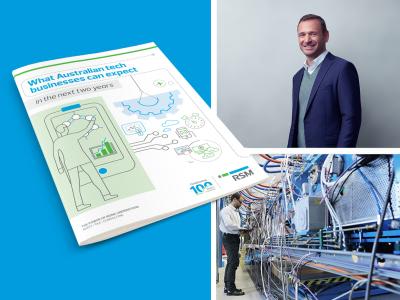Cashflow is the biggest threat to revenue for tech businesses in 2023/24, however the sector is optimistic about revenue growth, according to an RSM Australia national survey of tech leaders.
- 61% of tech businesses list cashflow in their top three business risks for this financial year
- One in five are struggling to access the funds they need to implement business plans
- Four in 10 plan to move into new markets this year, listing this as their biggest opportunity
- More than half (56%) say Federal Budget was not what the sector needed
- Parts of tech sector not prepared for sustainability reporting
71% of respondents were confident they would generate more revenue this financial year than in 2022/23, with 22% expecting to hold the line and only 7% forecasting a revenue dip. RSM Australia’s national technology lead, Mathavan Parameswaran, said tech businesses were still feeling the pinch from reduced access to capital, although not as markedly as last year.
One in five (21%) are struggling to access the funds required to implement business plans; 19% say lack of access to capital has prompted them to undertake M&A activity this year, and a further 25% had to reduce their valuation expectations. More than a third (35%) are cost-cutting to ease the pressure.
Reality check brings focus on cashflow
“Last year the tech sector was uneasy about the lack of available capital, now cashflow is top of mind. This is a good sign – they understand they can’t just keep going back and asking for money, it’s important to manage the business well and this includes renewed focus on controlling cashflow,” Mr Parameswaran said.
Almost two-thirds of respondents (61%) listed cashflow in their top three risks to business operations, with 37% naming it the greatest risk. This was three times greater than any other nominated business
Risk, which included attracting and retaining staff (a top three risk for 58.5% of respondents; 15% named it the top risk), staffing costs (51%; top risk for 12%), access to funds (44%; 7%) and cyber threats (29%; 10%).
The tech sector is less concerned about interest rates: only 11% listed interest rates in their top three concerns, with no respondent listing it as their biggest concern.
The struggle for capital and cashflow control comes on the back of challenging market conditions and a May Federal Budget that did not fully resonate with the tech sector, Mr Parameswaran said.
More than half of respondents (56%) said the Federal Budget was not what the tech sector needed, with 44% thinking it was good for the sector. A third of tech businesses (34%) have already started to see, or expect they will soon see, an impact from the Federal Government’s move to clear the migration backlog and to change visa requirements. Two thirds (66%) have yet to see an impact.
“The Government’s actions around clearing the migration backlog have helped, but more support is needed for the tech sector to be competitive when it comes to attracting and retaining staff,” Mr Parameswaran said.
When commenting on the Federal Budget, one respondent mentioned the challenge of the Government’s attitude to tech, saying the pressure being put on traditional financial institutions was “having an impact downstream” in terms of access to funding.
Another pointed out the perceived lack of opportunity for Australian companies to tender to government agencies, commenting “these agencies seem to favour international entities”.
Biggest opportunity to grow tech business in 2023/24
When asked to identify the biggest opportunity this financial year to grow their tech business, 42% of tech leaders said new markets, with others pointing to specialist tech (19.5%) and M&A activity (15%).
“This reflects the continual optimism of Australia’s tech sector about new market opportunities. Tech is still innovating and looking to expand into other countries and showcase their products.
There’s a strong self-belief that their products address market and consumer needs.
“We’re working with tech clients who are looking to expand in the US via M&A activity, as that is sometimes an easier road for entering new markets.”
Mr Parameswaran saw positive signs for an increase in M&A activity after this stalled in 2022: “the appetite is coming back to embark on mergers and acquisitions for growth”.
Parts of tech sector not prepared for sustainability reporting
The survey asked tech leaders how prepared they were to adopt new globally consistent sustainability reporting standards that come into effect from 2024 - 58% said they were not prepared.
“I don’t think tech differs too much from other sectors in terms of preparedness: larger companies are getting ready for it but often smaller companies, with understandably fewer resources, may be lagging,” he said.
“Tech companies of all sizes should still be mindful that meeting ESG standards is increasingly a community expectation, so it’s not something to fall behind on. It’s advisable to start talking to trusted advisors to put in place a roadmap so you can demonstrate to stakeholders that you’ve started addressing ESG.”







